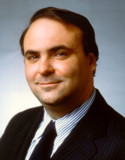Humphrey Event: Direct National Popular Vote in Presidential Elections

An event Monday afternoon, May 16th, at the University of Minnesota’s Humphrey School of Public Affairs examines the movement afoot that seeks to implement an electoral system with a direct, nationwide popular vote.
Panelists at the event are Dr. John Koza (pictured above), Chairman of National Popular Vote, and Minnesota Republican State Representative Duane Quam (HD-29A).
(National Popular Vote Inc. is a 501(c)(4) non-profit corporation whose specific purpose is to study, analyze and educate the public regarding its proposal to implement a nationwide popular election of the President of the United States).
The organization states that the national popular vote has been endorsed by 2,110 state legislators across the country and that supportive legislation has passed 31 legislative chambers across 21 jurisdictions in Arkansas, California, Colorado, Connecticut, the District of Columbia, Delaware, Hawaii, Illinois, Maine, Maryland, Massachusetts, Michigan, Nevada, New Jersey, New Mexico, New York, North Carolina, Oregon, Rhode Island, Vermont, and Washington.
From the Humphrey School’s Center for the Study of Politics and Governance press release:
Getting to Majority Rule in Presidential Elections
Monday, May 16th, 2011
12-1:15 p.m.
Humphrey Forum, Humphrey School of Public Affairs
301 19th Avenue South, Minneapolis, MN
“American presidents are elected by winning a majority in the Electoral College and not by winning majorities. This has produced presidents who have lost the popular vote (as in the 2000 election) or come close (as in 2004).
Reformers are seeking to make sure that winning presidents enjoy the popular and Electoral College majorities. One of the serious efforts is the National Popular Vote bill to effectively replace the Electoral College system with a direct, nationwide vote of the people. Under this bill, all of the state’s electoral votes would be awarded to the presidential candidate who receives the most popular votes in all 50 states and the District of Columbia. The bill would take effect only when enacted, in identical form, by states possessing a majority of the electoral votes.
Please join us for a conversation with Dr. John Koza, President of National Popular Vote, and Representative Duane Quam, who will discuss their arguments for and against the National Popular Vote bill. This event will be moderated by Professor Larry Jacobs.
This event is free and open to the public.”
